Zana Mody
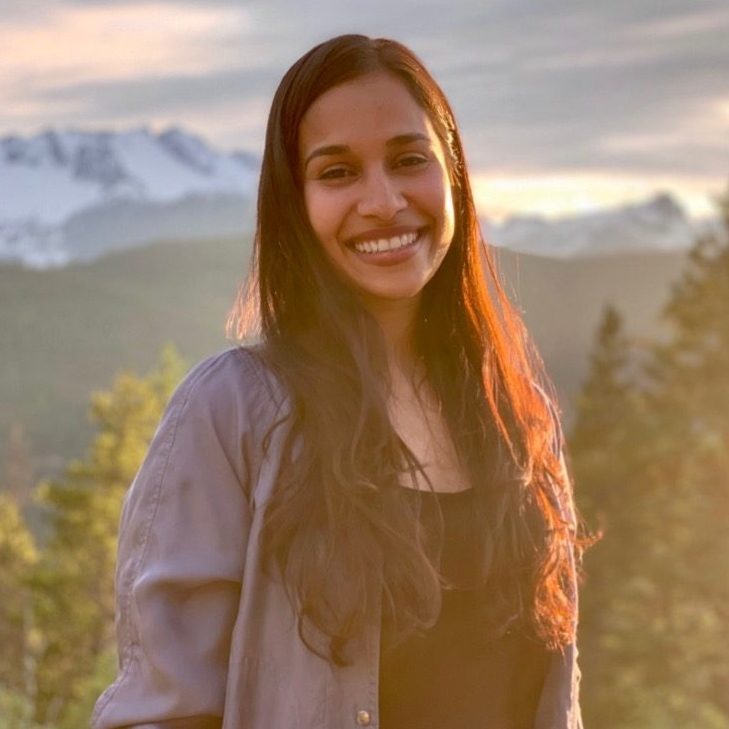
Zana Mody
PhD Candidate
Contact Details
Research Interests
Blue carbon, mangroves, coastal ecosystems, social-ecological systems, community-led conservation, NbCS, relational values, marine policy, climate change adaptation
Bio
Zana Mody is PhD candidate at the University of British Columbia’s IRES department and a recipient of the Tri-Council SSHRC Doctoral Fellowship, the Public Scholars Initiative grant and the International Development Research Centre’s Doctoral Award. She is supervised by Dr. Simon Donner and is a member of the Climate and Coastal Ecosystems Lab at UBC and The Mangrove Lab at Tulane University.
Zana’s interdisciplinary PhD research combines social-ecological systems, community-led conservation, and relational values frameworks to understand how blue carbon projects and coastal ecosystems, such as mangrove forests, impact the livelihoods and well-being of coastal communities vulnerable to climate change. She holds a Joint-Honours BSc. in Biology and Environmental Studies and a MA in Anthropology, both from Trent University. Her Master’s research focused primarily on South Asia and South-East Asia, where she worked with communities to study the ancient phenomenon of community-led conservation of biodiversity through the creation of sacred natural sites and developed a comparative research project in India, Sri Lanka, and Cambodia.
Zana’s professional career has included working as a radio journalist and producer at the CBC (Canadian Broadcasting Corporation) headquarters in Toronto, a lecturer in Anthropology at the College of the Rockies, developing and managing the Direct Action program at Ocean Wise, and consulting as a researcher at ESSA developing Indigenous-led Nature-based Climate Solutions projects. She is also a Liu Scholar, and her project is mentored by Dr. Rashid Sumaila (School of Public Policy and Global Affairs; Institute for the Oceans and Fisheries), which addresses the emerging field of blue carbon, marine policy surrounding carbon credits, and the socio-economic valuation of coastal blue carbon ecosystems.
Josh Travers
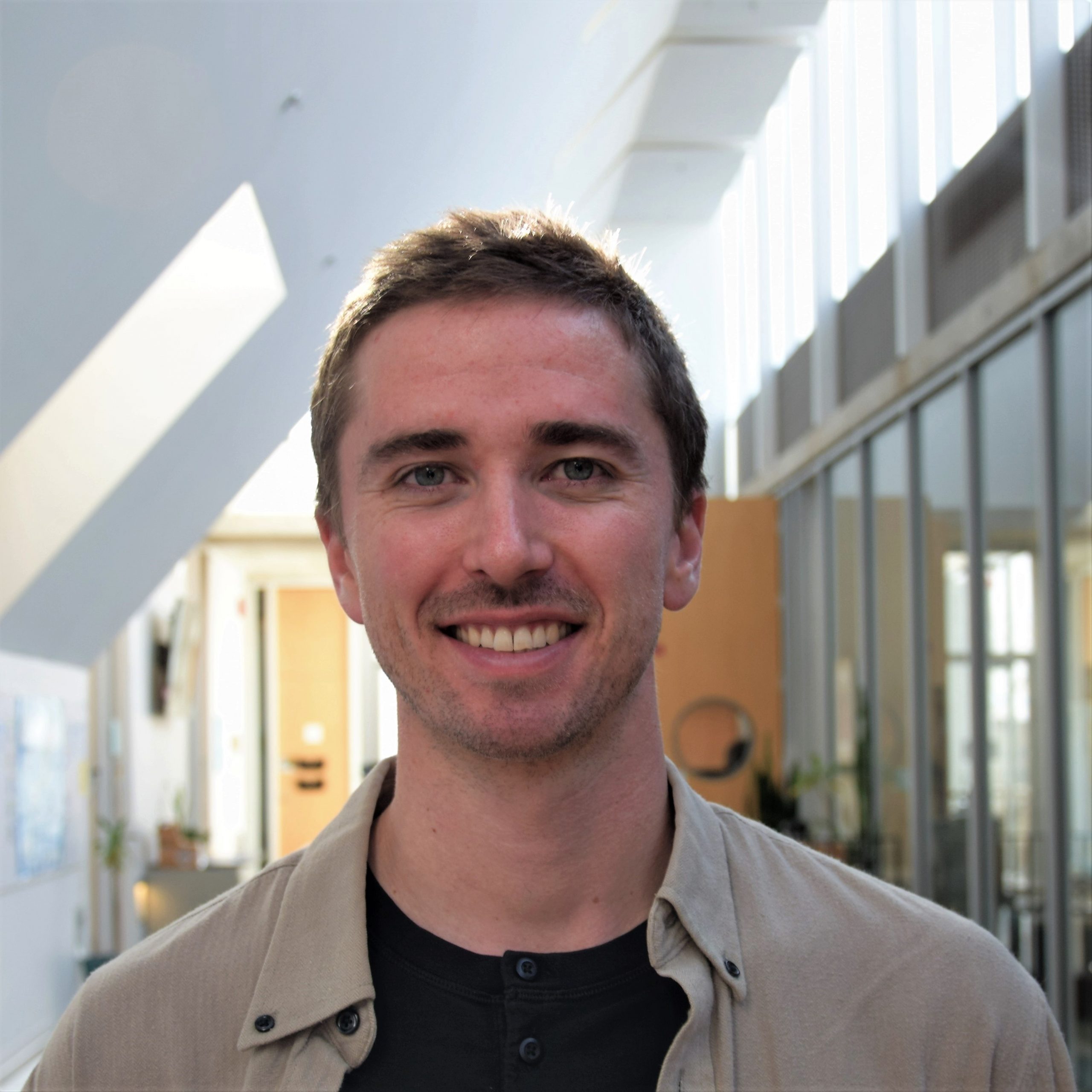
Bio
Josh completed his undergrad at Queen’s University in Global Development with a minor in Environmental studies. His undergrad focused on the practice of shifting the environmental burden of extraction to “developing” nations in order to conserve natural space in “developed” nations. Josh’s master’s thesis explores different conceptualizations of a circular economy for plastics amongst influential actors to understand the social and environmental implications. Josh is an Egesta Lab member, is a coordinator for UBC’s Microplastics Cluster, and is supervised by Dr. Gunilla Öberg. While at UBC, he has also completed two sustainability internships: with Technical Safety BC and Recycling Alternative.
April 20, 2023: IRES Student Symposium with Rumi Naito and Josh Travers (Last Seminar in Term 2)
1. The impact of conservation messaging on the exotic pet trade across diverse audience segments
2. Circular Economy for Plastics: social and environmental implications of a nebulous idea
Time: 12:30pm to 1:30pm
Location: AERL Theatre, Room 120, 2202 Main Mall.
View video here.
Talk summary:
Global trade in exotic pets threatens biodiversity. Past behavioral interventions for tackling the wildlife trade have only examined population-level effects, while overlooking individual differences within a given population. This study develops a novel audience segmentation approach to test the impact of conservation messaging on reducing demand for exotic pets and promoting public support for policy change. We identified four segments from a sample of U.S. participants (early adopters, early majority, late majority, and laggards), representing varying levels of commitment to wildlife conservation, and randomly assigned them to one of three messaging conditions. Messages highlighting the negative consequences of the exotic pet trade reduced demand among all segments except for early adopters, while messages emphasizing the power of collective action only motivated the early majority to sign petitions. The four segments also showed different patterns of reasoning for action and inaction. These findings help target conservation campaigns to diverse audiences.
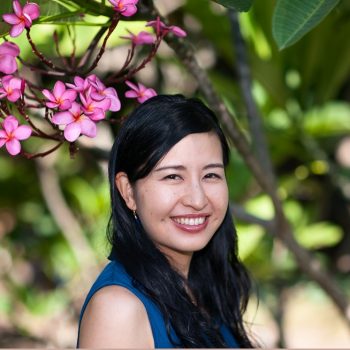
Bio:
Rumi Naito is a PhD candidate at the Institute for Resources, Environment and Sustainability, University of British Columbia. Her research focuses on the intersection between human behavior, biodiversity conservation, and transformative change. She applies insights from behavioral science and sociology to design and assess interventions for promoting wildlife conservation actions and to explore pathways towards sustainability. Prior to her PhD, Rumi worked in Indonesia as a senior project manager on conservation projects concerning collaborative land-use planning and reducing emissions from deforestation and forest degradation (REDD+). She holds a Master’s degree in International Affairs from Columbia University in New York.
Talk summary:
A circular economy for plastics is being put forth globally to manage plastic waste. The circular economy idea, however, is nebulous, and contested definitions of what it means to be “circular” are utilized by actors depending on diverging perspectives and needs. Moreover, the framing of circularity decides which actions are perceived to be required to achieve a circular economy. This study seeks to analyze dominant conceptualizations of circularity of plastics and the related proposed actions in order to clarify social and environmental implications of different conceptualizations.
To this end, semi-structured interviews are conducted with individuals with responsibility for plastics management in municipal, provincial, and federal governments, as well as those knowledgeable about the topic in ENGOs and the plastics industry. Thematic analysis and Calisto-Friant et al.’s typology of circular discourses are used to identify and categorize framings of circularity.
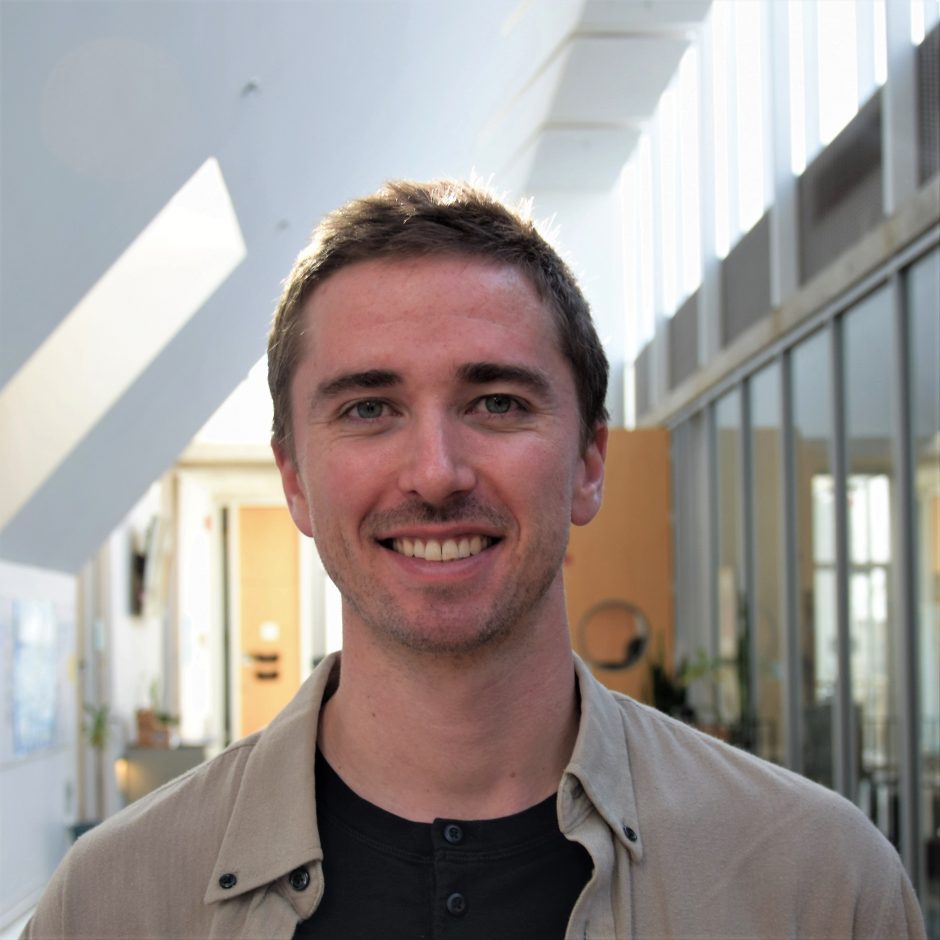
Bio:
Josh completed his undergrad at Queen’s University in Global Development with a minor in Environmental studies. His undergrad focused on the practice of shifting the environmental burden of extraction to “developing” nations in order to conserve natural space in “developed” nations. Josh’s master’s thesis explores different conceptualizations of a circular economy for plastics amongst influential actors to understand the social and environmental implications. Josh is an Egesta Lab member, is a coordinator for UBC’s Microplastics Cluster, and is supervised by Dr. Gunilla Öberg. While at UBC, he has also completed two sustainability internships: with Technical Safety BC and Recycling Alternative.
April 13, 2023: IRES Professional Development Seminar with Bekkah Coburn and Erica Triggs [IRES students only]
Handling Student-Supervisor Concerns
Time: 12:30pm to 1:20pm
Location: Beaty Museum Theatre (2212 Main Mall)
Click here to register in advance to receive a Zoom link.
Zoom Rule: If we encounter technical difficulties during the first 5 to 10 mins of the seminar, Zoom will be terminated.
No food or drinks allowed in the Theatre.
Talk details
Bekkah Coburn (Senior Manager, Faculty Relations) and Erica Triggs (Associate Director, Student Academic Support) will lead a panel discussion on student-supervisor concerns and how to handle them. They will address how to raise concerns, the University’s Policies on handling concerns and how students can be supported through the process.
April 6, 2023: IRES Professional Development Seminar with Tugce Conger, Ivana Zelenika, and Erika Luna
IRES Alumni Panel on Public Service
Time: 12:30pm to 1:20pm
Location: Michael Smith Labs Theatre (Room 102, 2185 East Mall)
Click here to register in advance to receive a Zoom link.
Zoom Rule: If we encounter technical difficulties during the first 5 to 10 mins of the seminar, Zoom will be terminated.
Note: This seminar will not be recorded.
No food or drinks allowed in the Theatre.
Talk summary:
This week’s IRES Professional Development Alumni Panel will focus on career pathways related to Public Service. We invite Dr. Tugce Conger, Dr. Ivana Zelenika and Erika Luna to talk about their professional journeys, from IRES graduate students to policy experts. Join us for this conversation with IRES alumni and find out more about their experience in this career option!

Bio:
Tugce is a Senior One Water Planner with the City of Vancouver’s Urban Watersheds, Sewers & Drainage division working on the strategic short and long-term planning of and collaboration for the Green Rainwater Infrastructure and other Integrated Rain and Stormwater Management solutions across the city. Tugce completed her Ph.D. in Resources Management and Environmental Studies at UBC in 2018, and her dissertation work focused on the use of coastal green infrastructure as a climate change adaptation tool, particularly for sea level rise induced flood and erosion issues.

Bio:
Ivana completed a PhD at IRES in 2018 under supervision of Jiaying Zhao and John Robinson, finishing a postdoctoral fellowship with Dr. Zhao in 2020. Majority of her thesis and research examined strategies to motivate sustainable behaviour. Ivana has been with City of Vancouver Solid Waste Programs since 2019 and is currently a Recycling Coordinator for the City’s Engineering Department. Main focus of her work is to develop and implement promotional and educational programs to increase public participation in zero waste goals, recycling and green bin programs.

Bio:
Erika Luna is a Junior Policy Analyst at the International Institute for Sustainable Development (IISD) with the Economic Law and Policy Program, focusing specifically on the state of sustainability initiatives at the value chain level. Erika holds a BSc. in Earth and Environmental Sciences from the Universidad Nacional Autonoma de Mexico and an MSc. from the Institute for Resources, Environment and Sustainability at the University of British Columbia (UBC). While her master’s program strongly focused on identifying agricultural production trends using data science methods, Erika also worked as a research assistant on a Gender Data & Development project and collaborated on a project looking to increase equity, diversity, and inclusion in the sciences. Erika is originally from Mexico City, and in her spare time, she likes to play Ultimate Frisbee and go for runs along Vancouver’s seaside.
Mar 7, 5am – 7 am PST | Women, Girls, and the Right to a Healthy Environment
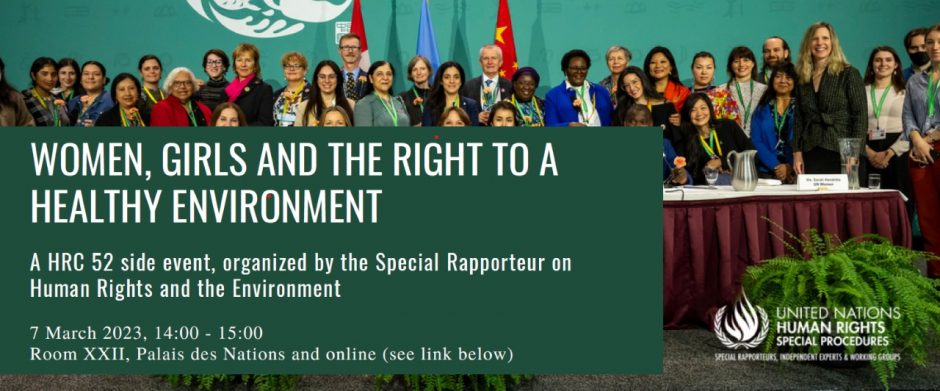
For the 52nd session of the Human Rights Council, Dr. David Boyd (IRES/SPPGA Associate Professor, UN Special Rapporteur on human rights and the environment) is launching a report on the topic of Women, Girls and the Right to Healthy Environment. Read the report here.
Click here to join the meeting online
Opening Remarks
- H.E. Anita Pipan, Ambassador and Permanent Representative of Slovenia
- Adriana Quinones, Head, Human Rights and Development, UN Women in Geneva
Introduction
- Message from a girl environmental defender, Nikte’ from Guatemala (video)
Panelists
- David Boyd, Special Rapporteur on Human Rights and the Environment
- Viviana Tinoco Monge, Minister Counsellor, Permanent Mission of Costa Rica
- Prisca, Youth representative from Rwanda (remote)
- Stephanie Keene, International human rights lawyer
- Soo Young Hwang, Legal Officer, UNEP
Moderator
- Diana Rizzolio, Coordinator, Geneva Environment Network
Please write to hrc-sr-environment@un.org in case of any queries.